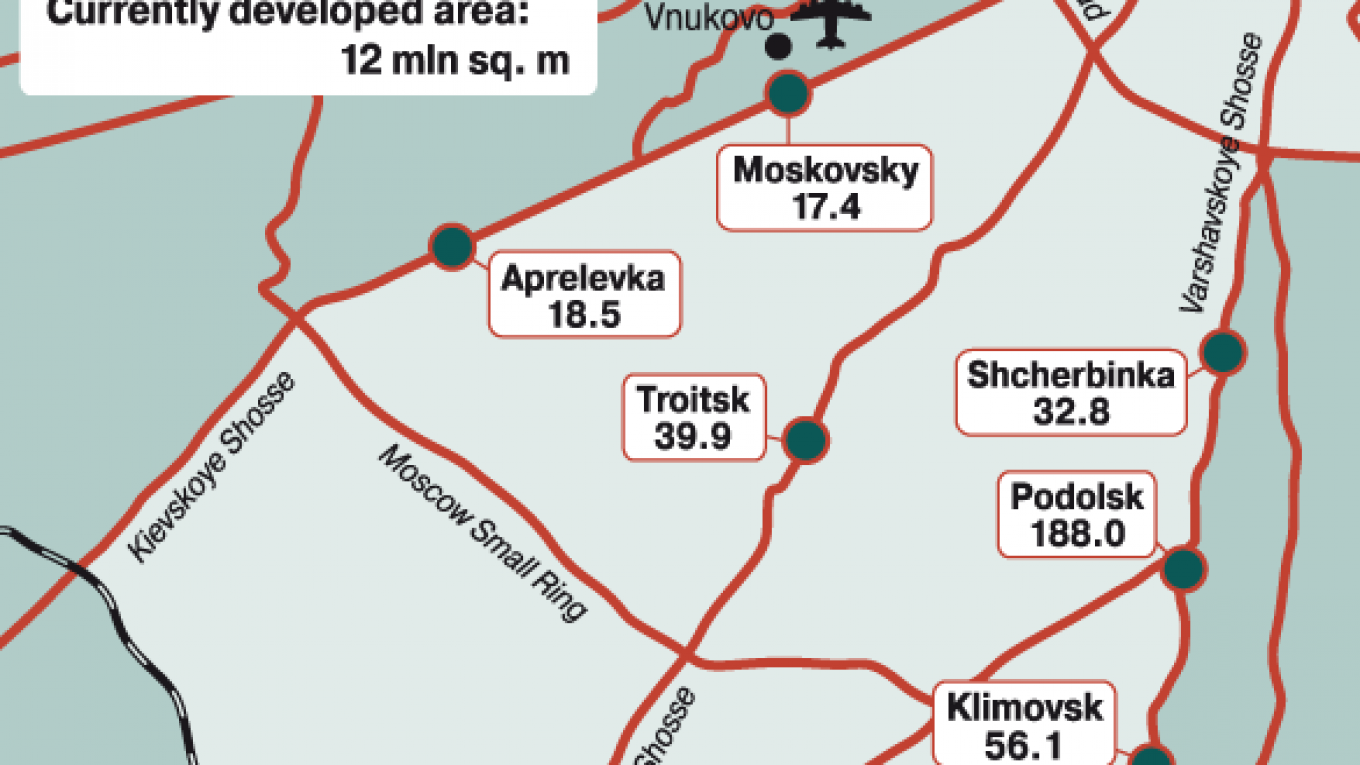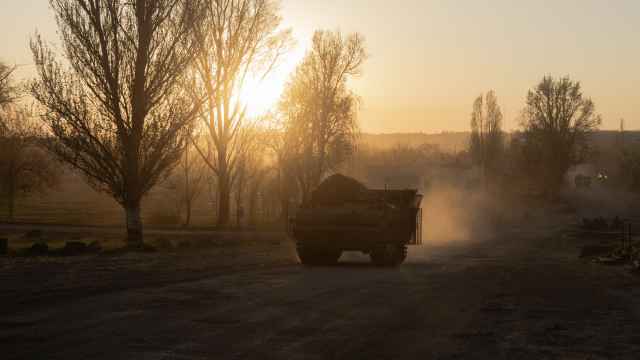Developing the territory adjoining Moscow that is part of the Kremlin’s ambitious plan to expand the capital’s boundaries could take up to 20 years, City Hall said Tuesday, in what analysts see as a challenging but achievable task.
“It will take 20 years, I think, to fulfill this task by 100 percent,” said Marat Khusnullin, head of City Hall’s urban construction department.
The time frame for developing the additional 144,000 hectares would be determined after changing the city development plan through 2025, Khusnullin said, Interfax reported.
The size of Moscow will more than double according to a plan drafted by Mayor Sergei Sobyanin and Moscow region Governor Boris Gromov on Monday, following the idea voiced by President Dmitry Medvedev at the St. Petersburg International Economic Forum last month to turn Moscow into a new federal district and relocate government and financial institutions beyond the current city boundary.
Analysts said the target is achievable, but implementing the plan could result in numerous problems.
Expanding the city boundaries is “an enormous challenge,” but it’s realistic, said Robert Vartevanian, head of the infrastructure and project finance group at KPMG in Russia and the CIS.
“Moscow is already a city of global scale — one of the world’s largest cities by population. But it’s not yet global in terms of support infrastructure in the broadest sense and the ability to attract international finance,” he said.
The city government has to find ways apart from the budget to finance the project, with cooperation with private investors being one possible option, Vartevanian said.
Finance Minister Alexei Kudrin promised last month that relocating government offices would not cost the federal budget a single kopek because of revenues generated by downtown real estate that will be made available by the move.
According to the plan drafted by Sobyanin and Gromov, the overall area of the city of Moscow will grow 2.4 times and cover 251,000 hectares, compared with the current 107,000 hectares. Additional territory will come from the south and southwest of the Moscow region.
An additional 60 million square meters of housing and 45 million square meters of office space could be built on the territory, which currently has 12 million square meters of developed area, City Hall said in a statement Monday.
This will provide housing to 2 million Muscovites and create 1 million jobs, the statement said.
There is a sufficient number of workers because annual residential construction volumes in Moscow dropped from the pre-crisis level of 5 million square meters to 1.7 million square meters last year, said Oleg Repchenko, director of the IRN.ru real estate portal.
As a result, about two-thirds of the construction labor force from former Soviet Union countries is available, he told The Moscow Times.
But the costs of building roads and infrastructure are likely to result in a 30 percent increase of housing prices in the territory, to reach levels of 100,000 rubles to 120,000 rubles ($3,600 to $4,300) per square meter, he said.
Corrections to the Moscow development plan through 2025 will be done simultaneously to steps that will turn Moscow into a new federal district, Vladimir Platonov, head of the City Duma, said Tuesday, RIA-Novosti reported.
City Hall also plans to review the program to develop the Moscow transportation network, taking into account the expanded city territory, Deputy Mayor Nikolai Lyamov told RIA-Novosti, adding that moving government agencies outside the city center would help relieve Moscow’s heavy traffic.
Meanwhile, Liberal Democratic Party leader Vladimir Zhirinovsky called for further expansion of the city boundaries at a meeting with Medvedev on Tuesday in order to unite the city and the region into a “Big Moscow.”
Among those who will benefit from the Kremlin initiative are local steelmakers, which will be able to increase supplies of construction steel to the domestic market, said UralSib analyst Dmitry Smolin.
The construction industry hasn’t fully recovered from the crisis, with steelmakers operating at just 75 percent to 80 percent of their production capacity, Smolin said, adding that new development projects will allow companies like Evraz and Mechel to increase their capacity utilization.
The construction sector’s consumption of rolled steel is expected to reach up to 16 million metric tons this year, compared with 22 million metric tons consumed in pre-crisis 2008, Smolin said.
But what is largely expected to contribute to Moscow’s overall prosperity could result in problems for people now residing in the region.
Dmitry Baranov, an infrastructure analyst at Finam, said it’s unclear what will happen to the owners of the numerous private plots of land located in the area designated for the international financial center.
“It’s a huge problem from the human point of view. Money takes a back seat to the question of people’s destiny,” he told The Moscow Times.
Baranov compared the Moscow project with the Olympic construction in Sochi, where the authorities’ efforts to compensate residents whose land was seized to make way for Olympic venues have been met by numerous protests.
The situation in Moscow could be even worse, he said, because “the land is more expensive, people have put down roots.”
Though Moscow ranks as the world’s fourth most expensive city to live in, Brazil’s two biggest cities, Rio de Janeiro and Sao Paulo, are among the highest climbers on the list, as the nation’s economic growth continues to outpace Europe and the United States, Bloomberg reported.
Sao Paulo jumped to 10th place in the list of 214 cities, from 21st last year, while Rio de Janeiro surged to 12th from 29th, according to a report Tuesday from consulting firm Mercer. Luanda in Angola remained the world’s most expensive city as accommodation prices hit a record. Tokyo retained second spot, while Geneva, at fifth, and Zurich at seventh, were Europe’s only top 10 entries. No U.S. city made the top 10.
Brazil’s economy grew by 7.5 percent last year, the most in two decades, and consumer prices are estimated to rise 6.3 percent this year, according to the median forecast in a July 8 central bank survey of about 100 economists published Tuesday. The U.S. economy grew at 2.9 percent last year while Britain's economy grew by 1.4 percent.
The rise in the Brazilian real against the dollar caused the country’s “cities to rise in the ranking,” Nathalie Constantin-Metral, a senior researcher at Mercer, said in the report. “In most European cities the cost of living for expatriates has remained relatively stable.”
Singapore moved to eighth from 11th while New York City dropped to 32nd spot from 27th and London slipped one place to 18th. Dublin moved to 58th most expensive city from 42nd.
A Message from The Moscow Times:
Dear readers,
We are facing unprecedented challenges. Russia's Prosecutor General's Office has designated The Moscow Times as an "undesirable" organization, criminalizing our work and putting our staff at risk of prosecution. This follows our earlier unjust labeling as a "foreign agent."
These actions are direct attempts to silence independent journalism in Russia. The authorities claim our work "discredits the decisions of the Russian leadership." We see things differently: we strive to provide accurate, unbiased reporting on Russia.
We, the journalists of The Moscow Times, refuse to be silenced. But to continue our work, we need your help.
Your support, no matter how small, makes a world of difference. If you can, please support us monthly starting from just $2. It's quick to set up, and every contribution makes a significant impact.
By supporting The Moscow Times, you're defending open, independent journalism in the face of repression. Thank you for standing with us.
Remind me later.






